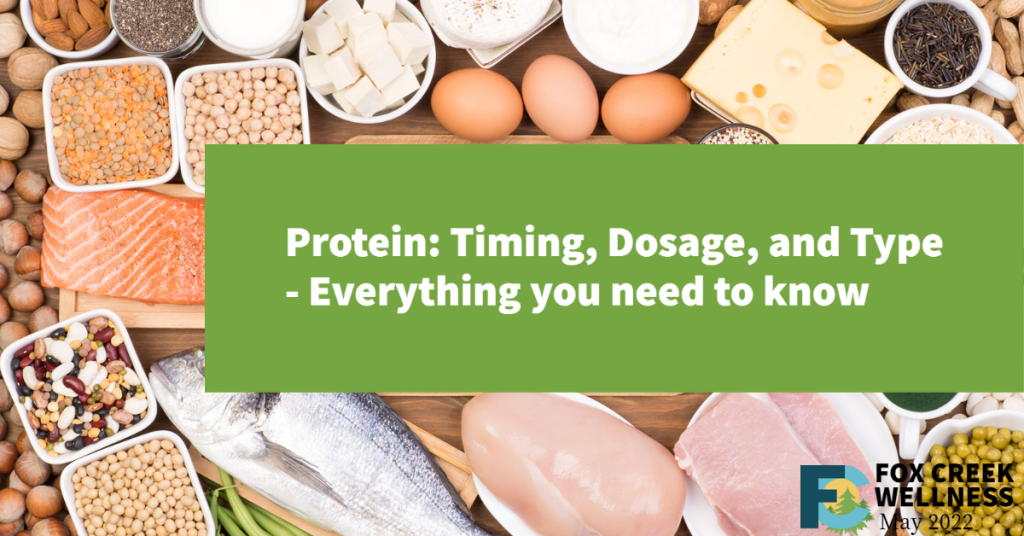
BY: Morgan Holmen
Let’s talk PROTEIN! Now, let me preface this article by saying that I am specifically referring to maximizing protein consumption for resistance-trained individuals. If you are someone who lifts weights at the gym, at home, or at a fitness class- then I am speaking to you! This article will also benefit anyone looking to engage in more resistance exercise- because as I’ve previously discussed, resistance training is crucial for maintaining strength and function as you get older. See October 2021’s Fox Creek Wellness
You’re probably already aware, but many exercise enthusiasts supplement with protein following a training session, which can provide significant benefit. However, these individuals could be reaping even greater benefits from their resistance training if they consume the proper type and dosage of protein and consume it at a specific time. At a cellular level, protein is made up of amino acids, which contains the characteristics that are essential for forming bodily structures, enzymes, and most importantly, muscle tissue.
Muscle growth only occurs when muscle synthesis is greater than muscle breakdown. The only way of doing this is by consuming dietary protein following an exercise session. After resistance training, the body goes into a state called negative nitrogen balance. This is a catabolic state where muscle breakdown exceeds muscle protein synthesis. The body will remain in a negative nitrogen balance only until protein is consumed, which will speed up the repair process (Ivy & Ferguson, 2010). The takeaway message here is that it is critical that protein is consumed immediately post-workout in order to synthesize muscle and avoid muscle catabolism.
A diet that is deficient in calories, despite adequate protein intake, will still yield a negative nitrogen balance. Basically, IF YOU DO NOT EAT ENOUGH FOOD, YOU WILL NOT GAIN MUSCLE. Not only is it important to consume protein post-exercise, but it’s crucial to consume enough food throughout the day.
The dosage required for optimal benefits for an exercising individual is 20g immediately after a split-routine exercise session (Farnfield, Carey, Gran, Trenerry & Cameron-Smith, 2009). For someone doing compound exercises or a full-body routine, this dosage should be doubled. The average person cannot metabolize more than 30-40g of protein per meal, so there are no greater benefits to consuming higher dosages as this will simply lead to oxidation and “expensive pee”. The average exercising individual will benefit from 0.4 g/kg per meal of protein (Ivy & Ferguson, 2010).
Protein source is also a very important factor to consider post-exercise. Whey protein is going to be superior to either casein or soy because it is full of essential amino acids and is quickly absorbed, which leads to rapid amino acid delivery to the muscles (Hulmi, Lockwood & Stout, 2010). Whey is naturally found in dairy, or milk-based proteins and has a high concentration of leucine, the main branched chain amino acid (BCAA) and the driving force behind muscle protein synthesis (Coburn et al., 2010). A strength-trained individual will want to consume at least 1.0-2.0 g/kg of bodyweight of protein a day in order to increase whole body protein synthesis. It is important to consume protein within the two hours immediately post-exercise because the greater amount of time that goes by, the less sensitized the body is to protein. A high dosage (20-40g) ingested immediately is important to initiate recovery because blood flow is maximized. Resistance training will increase the sensitivity of the body to protein ingestion for up to 24 hours post-exercise however, research shows the greatest benefits immediately following the training session.
References:
Ivy, J. L., & Ferguson, L. M. (2010). Optimizing resistance exercise adaptations through the timing of post-exercise carbohydrate-protein supplementation. Strength and Conditioning Journal, 32(1), 30-36. doi:10.1519/SSC.0b013e3181c01707
Farnfield, M. M., Carey, K. A., Gran, P., Trenerry, M. K., & Cameron-Smith, D. (2009). Whey protein ingestion activates mTOR-dependent signalling after resistance exercise in young men: A double-blinded randomized controlled trial. Nutrients, 1(2), 263-275. doi:10.3390/nu1020263
Hulmi, J. J., Lockwood, C. M., & Stout, J. R. (2010). Effect of protein/essential amino acids and resistance training on skeletal muscle hypertrophy: A case for whey protein. Nutrition & Metabolism, 7(1), 51-51. doi:10.1186/1743-7075-7-51
Coburn, J. W., Housh, D. J., Housh, T. J., Malek, M. H., Beck, T. W., Cramer, J. T., . . . Donlin, P. E. (2006). Effects of leucine and whey protein supplementation during eight weeks of unilateral resistance training. The Journal of Strength and Conditioning Research, 20(2), 284. doi:10.1519/R-17925.1
